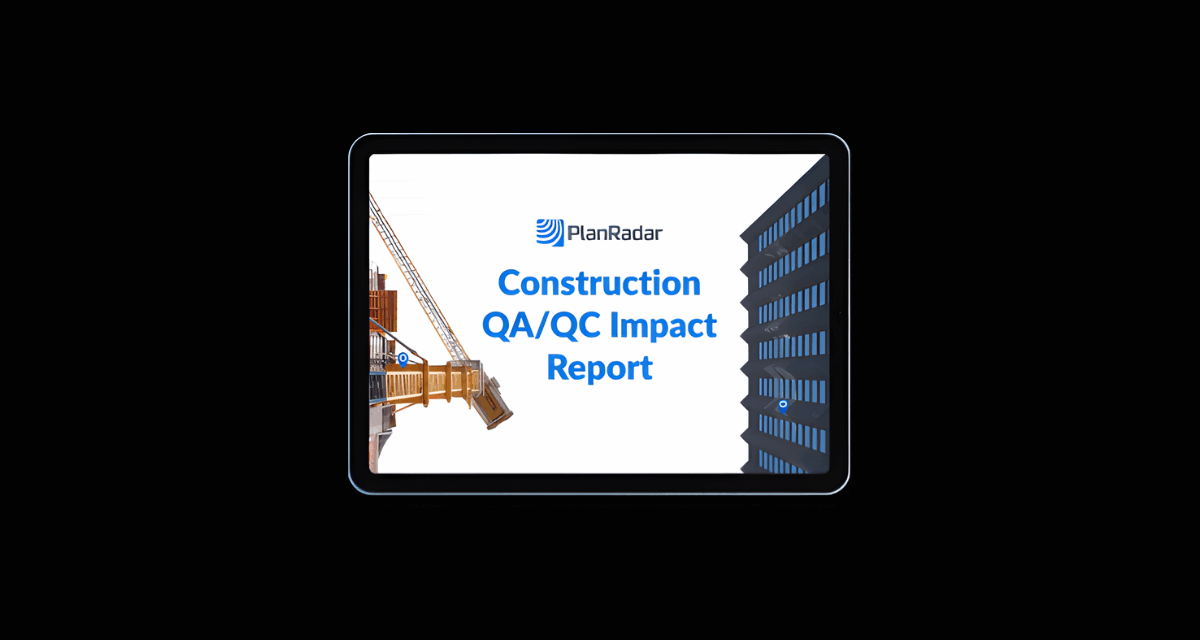Construction QA/QC Impact Report: Quality management is a top priority, but inconsistent standards are draining profit
A new study by PlanRadar, reveals a clear contradiction at the heart of quality management. Companies rank QA/QC among their top priorities when construction begins, with more than 70% of companies beginning QA/QC processes from day one of construction, yet 77% still report inconsistent documentation that varies across projects, sites and trades. This fragmentation pushes costs into the shadows and exposes projects to cascading disruption – from rework and schedule slippage to disputes and warranty claims.
The report traces how inconsistent QA/QC turns into reduced visibility, putting projects at risk of higher costs and lower margins. “Different standards across sites and trades” is the most common problem cited by respondents (56%), and over half (55%) acknowledge they lack enforceable processes. Where no common standard exists, cost visibility disappears: companies without defined QA/QC are nearly twice as likely to have no view of rework costs (43% vs 22%).
The same data shows the upside of consistency. Companies that apply QA/QC systematically are 28% more likely to report margins above 3% (60% vs 47%) and are far more likely to keep rework under 5% of budget (56% vs 37%). In practice, that advantage often comes down to eliminating variability: when approvals, forms and evidence are captured the same way on every site, leaders gain the defensibility and foresight to prevent small issues from growing into month-long setbacks.
Additionally, the report finds that quality misses can cause cascading challenges throughout projects, with two in three companies (67%) linking QA/QC failures to delays. Among those able to quantify the impact on project schedules, nearly six in ten say quality issues add more than two weeks on average, and almost one in four report delays extend beyond a month. Commercial exposure doesn’t stop there: firms without consistent standards are over 50% more likely to face warranty risk (54% vs 35%) and are 23% more likely to encounter subcontractor disputes (43% vs 35%).
The findings, detailed in PlanRadar’s new industry report, Construction QA/QC Impact Report, provide a comprehensive snapshot of QA/QC execution across Europe, the Middle East and Asia-Pacific. A total of 811 qualified professionals who directly perform or oversee QA/QC participated, spanning project and construction consultancies, general and specialty contractors, architecture firms, developers/owners and other construction entities across 13 countries.
Driving consistent QA/QC remains a challenge. Many organisations say they “enforce” QA/QC, yet standards still vary across teams and subcontractors. The core issue is weak process: over half lack an enforceable subcontractor approach, and single, site-based platform for QA/QC is still the exception.
A UK perspective on market challenges
The study’s UK-specific findings reveal particular challenges for British construction firms and highlight key differences from the global outlook.
Significantly, 78% of UK respondents agreed that better QA/QC would improve their margins, with 36% identifying reducing rework and costs as their top priority for improving quality processes.
When things go wrong, UK respondents said the main impact is project delays and lost time, with 75% reporting this, whereas globally the emphasis is on rework that could have been avoided (71%).
Furthermore, when delays do happen, UK firms see the greatest cost as damage to client relationships (72%), while globally the top concern is the added labour and overtime costs (76%).
In short, the UK view of QA/QC is more people-centric and client-oriented, with challenges framed around team compliance, project timelines, and client trust. Globally, the emphasis is more on structural complexity and financial cost – different standards, rework, and extra labour.
Rob Norton, UK Director at PlanRadar, commented: “These findings reflect what we’re seeing across UK construction sites daily. The industry recognises that consistent QA/QC is fundamental to profitability, yet most firms are struggling with the practical execution. When 61% of UK companies can’t ensure their teams follow the QA/QC plan, and only 22% achieve consistent documentation, we’re looking at a systemic challenge that’s directly hitting margins and client relationships. The 72% who report that quality delays damage client relationships understand the real cost – it’s not just about immediate rework expenses, it’s about long-term business sustainability. The solution lies in moving beyond paper-based processes to unified digital standards that teams can actually follow consistently across every site and trade.”
Sander van de Rijdt, PlanRadar’s Co-Founder and CEO, commented: “QA/QC is a top priority in the construction industry. The challenge is making it consistent. Our research shows that when every site and trade follows a different playbook, quality outcomes become chance – and costs become unpredictable. The path forward is clear: unified, enforceable QA/QC standards that create visibility, reduce disputes and protect margins.”
PlanRadar was designed to close this execution gap. As a leading platform for digital documentation, communication, and reporting, it enables construction teams to embed quality processes directly into daily workflows. By utilising its SiteView 360° reality capture, a simple site walk with a helmet-mounted camera delivers a full 360° visual record of progress, while QA/QC data is captured simultaneously in adaptable formats to meet trade and industry requirements. This ensures every build stage is documented with both visual evidence and structured QA/QC data, enabling teams to identify issues earlier, reduce rework and keep projects moving with greater certainty.
For more detailed insights, the full report and dataset are available here.


